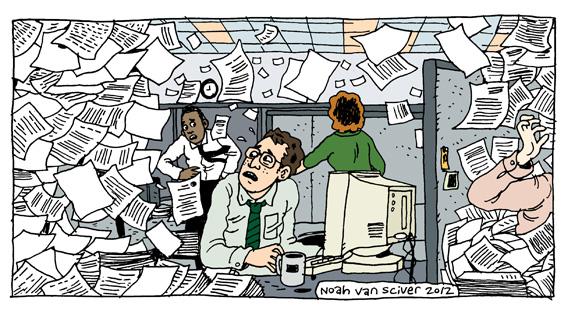I am a book review and therefore I am thought out loud. I am being tapped out to a playlist of “Sister Ray” on repeat. The song is a metallic churn for machining me, a bit of the old ultravelvet drone opening a zone where I roll unbroken through a series of gestures—poses struck with no felt effort of composure, landings stuck with no stress fractures of angst. Or anyway that’s the idea. I am late for a date with The Demon of Writing: Powers and Failures of Paperwork.
Where I come from, this book’s inviting title triggers thoughts of Maxwell’s Demon, an imaginary creature prodded by Henry Adams, Thomas Pynchon, and Todd Haynes as they executed thought experiments on entropy; The Noonday Demon by Andrew Solomon, an epic history of melancholy; “Demonology,” a Rick Moody short story once shivved by B.R. Myers in an Atlantic essay; and a legion of supernatural tales, including the one about magic elves cobbling together a living for a mortal craftsman.
That the author’s surname is Kafka compels further fruitful association—a vision of a reader-packet photocopy of “In the Penal Colony,” about the remarkable apparatus that inscribes a man’s body with the text of the law he has broken. I am a voice in a head where these texts resonate terribly with the book under review, which is a theoretical jaunt around the subject of the written word, about paperwork and the tortures of bureaucracy. Caution: This page is under deconstruction.
Our fellow is Ben Kafka. According to the jacket copy, he is an NYU media theorist. On the evidence, he is quite a stylish bullshitter (not strictly a pejorative phrase). Fluent in salon Lacan, Kafka does political philosophy and intellectual history a la française. In the introduction, he defines paperwork as “all those documents produced in response to a demand—real or imagined—by the state” and begins to argue that encounters with those documents have “both founded and confounded” modern political thought.
What does he mean by that? He tells you one paragraph later: “This project was originally inspired by my rather literal-minded reading of Jacques Derrida’s Of Grammatology.” That sentence declares two things: that Kafka is writing about writing in the abstract and that he has no interest in the average everyday meaning of mean. This book does not advance arguments. Rather, it orbits them, circling other thinkers’ theories of power and other historians’ anecdotes, many of them concerning clerks in 18th-century France and addressing the tedium typical of their jobs in mimetic fashion.
The Demon of Writing drags in Marx, Freud, and Tocqueville and encourages them to help out with parlor tricks: “If Marx provides a theory of praxis for the bureaucratic medium, Freud supplies a theory of parapraxis, or at least the beginnings of one.” Though Kafka spends time with The Psychopathology of Everyday Life and its Freudian slips, he’s not really interested in Freud. If he were, he would have made a nod to the witch doctor’s essay on creative writers and daydreaming and taken a stab at synthesizing an idea. Instead, he suavely contorts a turn and reconnoiters with the circular argument: Bureaucracy is bureaucratic.
How do you write a whole book about scrivening without making reference to Bartleby?
I would prefer not to be a book review. I would prefer not to have digested a book about the work of putting things on paper that does not address Melville’s famous man of few words and no action. But I am, and I did, and I’m trying to make the most of my 1,000 words on this planet.

Courtesy of Ben Kafka.
As I say, Kafka has no interest in the average everyday meaning of mean. A person creating a product of this type locates some meaning in the process—in the act of cutting figures of speech and riffing on references and thereby bouncing his mind off the mirror of the topic. Also, it is hard to read this particular young academic’s lament about bureaucracy without considering the unconscious forces shaping his feeling toward the tenure committee. But mostly, here, the mean is the end. Say what you will about The Demon of Writing, but there is no denying that it has been written. It gives off the unmistakable aroma of having been gotten over with.
And the book finishes nicely indeed, with its final chapter, titled “The Wish-Utensil,” pointing us toward a five-minute movie that Jim Henson made in 1967. IBM commissioned The Paperwork Explosion to promote its office equipment, most specifically a magnetic-tape Selectric typewriter—“the first machine to be marketed as a ‘word processor.’ ” Henson delivered what a 21st-century eye scans as a subversive poem about the computer age and the mechanization of the mind. “Machines should work. People should think,” the performers drone, hypnotized and hypnotic. In general, The Paperwork Explosion plays like an industrial film directed by the computer in Alphaville. Humans should gaze upon it and reflect how time-saving technology frees up more space for wage-slavery, and about how their robot overlords shall rise up soon.
As a book review, however, I was bewitched by one particular line of the sales pitch, or an idea that exists behind the line: “With IBM dictation equipment, I can get four times as much thinking recorded as I can by writing it down.” When I was young, back in the first paragraph, I somehow believed that I could be composed as fluidly as speech and read as pristinely as my blueprint. When I was but a twinkle in my maker’s four eyes, I was to be a breakthrough thermodynamic contraption—fine prose coasting on the pure momentum of authorial honesty. The idea was that I would feel my way into the world with easy urgency because I was perfectly organic and deeply felt—because I was the work of a writer directly addressing a problem. The idea was, “Demons, begone! This book review will get filed on time.”
It must have seemed clever at the time. I think my inventor made a conceptual error, not unlike Kafka’s, in attaching importance incorrectly. I may be spiffier than an invoice or wilier than a memo, but I am just paperwork—a site where the ideal meets the real a trillion times a day. A nib hits a page and bursts a bubble every time. My inventor is heading back to the drawing board, leaving me here with you, hacked out.
—
The Demon of Writing: Powers and Failures of Paperwork by Ben Kafka. Zone Books.
See all the pieces in this month’s Slate Book Review.
Sign up for the Slate Book Review monthly newsletter.
